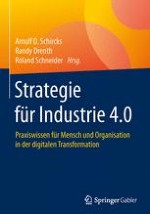2017 | OriginalPaper | Buchkapitel
5. Workspace Design für höhere Innovation und Effizienz
Die Arbeitswelt 4.0 – neue Raumkonzepte für mobile Wissensarbeiter und Unternehmen in der digitalen Transformation
verfasst von : Annina Coradi, Danny Schweingruber
Erschienen in: Strategie für Industrie 4.0
Verlag: Springer Fachmedien Wiesbaden
Aktivieren Sie unsere intelligente Suche, um passende Fachinhalte oder Patente zu finden.
Wählen Sie Textabschnitte aus um mit Künstlicher Intelligenz passenden Patente zu finden. powered by
Markieren Sie Textabschnitte, um KI-gestützt weitere passende Inhalte zu finden. powered by
